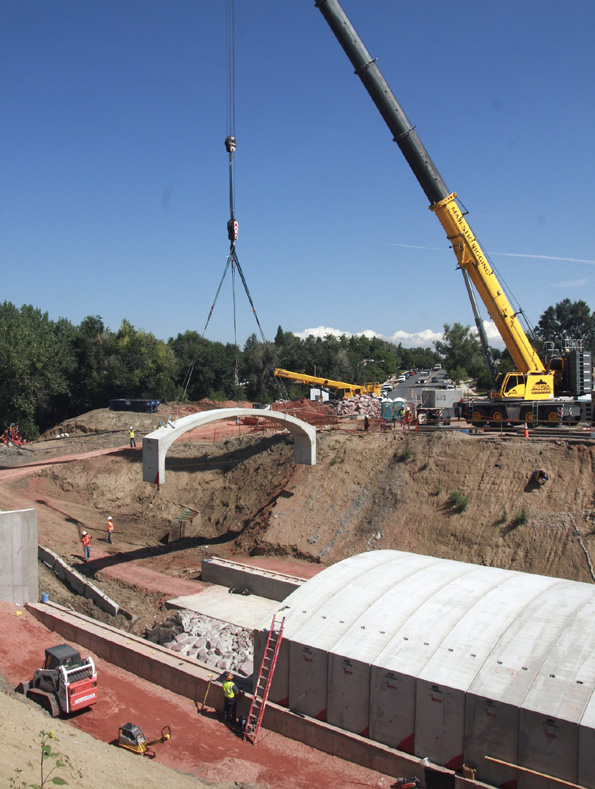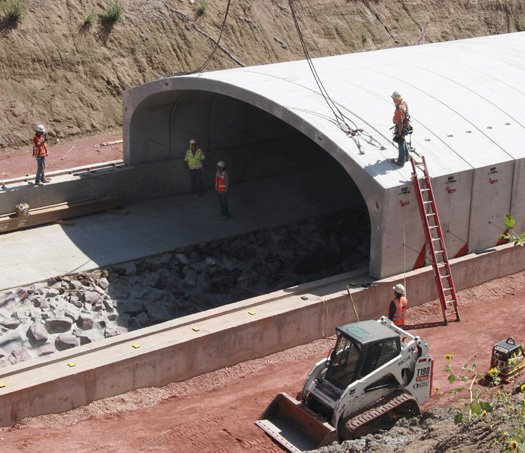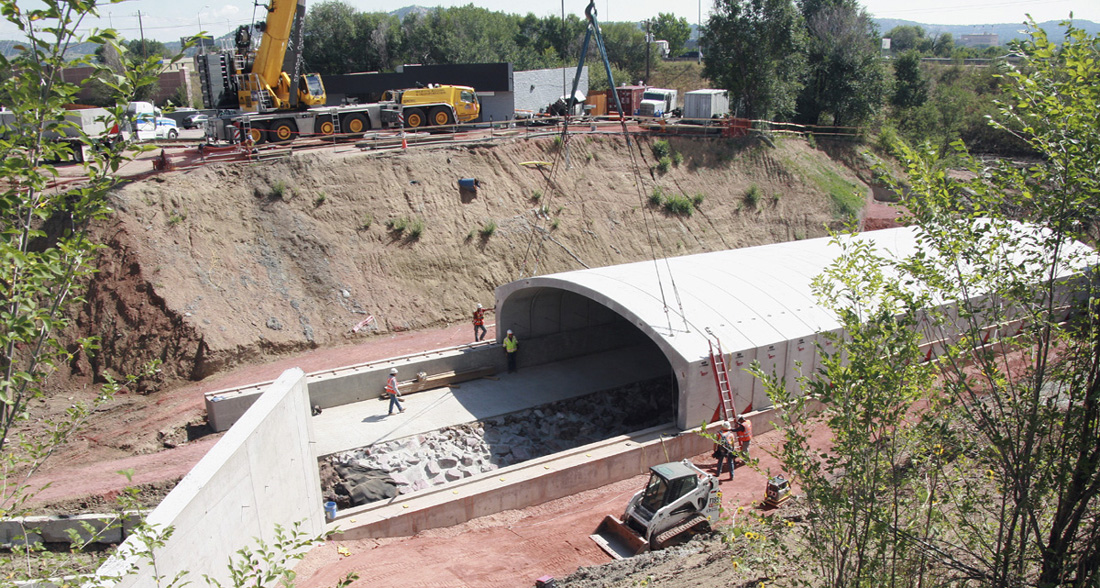|
Culvert built for Chestnut Street bridge; schedule still calls for November reopening
 A 27˝-ton, pre-cast concrete arch is lowered
about 30 feet by a giant telescoping crane sitting at street level (the north side of
Chestnut Street). The crane, similar to the type used to set girders at the Fillmore
and Cimarron interchanges, is lowering the arch onto a previously built pedestal,
joining the previously set arches (see photos above and below).
A 27˝-ton, pre-cast concrete arch is lowered
about 30 feet by a giant telescoping crane sitting at street level (the north side of
Chestnut Street). The crane, similar to the type used to set girders at the Fillmore
and Cimarron interchanges, is lowering the arch onto a previously built pedestal,
joining the previously set arches (see photos above and below).
Westside Pioneer photo
|
Each is 36 feet long by 11 feet high and weighs 27˝ tons, according to Alex Pellegrino, project manager for Colorado Springs Engineering. Over a two-day period in late August, a 450-ton-capacity crane sitting at street level lowered them, one at a time, onto previously poured concrete pedestal walls in the deeply excavated space below.
The resulting culvert, 36 feet wide by about 140 feet long, is designed to carry both the flow of South Douglas Creek and the 12-foot-wide, paved Sinton Trail. The culvert is also made to hold the weight of compacted dirt - laid over it to a height of about 30 feet - as well as Chestnut Street traffic when a newly paved road is reopened over that dirt.
The culvert replaces the former eight-foot-wide corrugated-metal pipe. Its failure in August 2015 forced the road closure between Vondelpark Drive and Ellston Street and triggered emergency efforts by city engineers to replace the pipe and get the road reopened.
To avoid drainage issues during the project, the creek flow is being temporarily diverted through a wide, long rubber pipe, Pellegrino noted.
The arch-laying job was a “great indication of the progress already completed on the project,” he said. “This was an unscheduled project. We thank area residents and businesses for their patience and we are pleased to say the bridge is on schedule to reopen in November.”
 Workers gather above and below the just-placed concrete arch (see photos above)
inside the culvert that's taking shape as part of the work to reopen Chestnut Street
between Vondelpark and Ellston.
Workers gather above and below the just-placed concrete arch (see photos above)
inside the culvert that's taking shape as part of the work to reopen Chestnut Street
between Vondelpark and Ellston.
Westside Pioneer photo
|
He did note one unavoidable, though temporary drawback: The Sinton Trail will not be able to go under Chestnut Street inside the culvert for at least another year. The Colorado Department of Transportation (CDOT) needs to stabilize the slopes around its Douglas Creek culvert where it goes under I-25, a short ways downstream and has to use that part of the trail route for equipment access, Pellegrino said. However, trail users can still cross Chestnut at street level, as they do now.
The Chestnut bridge replacement is being funded by the Pikes Peak Rural Transportation Authority (RTA). The pipe had been scheduled for replacement through the RTA in 2019, but its break four years before that caught everyone by surprise. Forced to plan at an unusually accelerated pace, city engineers considered a traditional span-type bridge, but determined that the precast arch culvert structure type “is approximately 25 percent less expensive than a traditional single span bridge,” a city press release states.
Public input was also taken in the replacement-planning process, including the suggestion for the arch design to make the trail feel more open.
The $3.5 million cost encompasses design, construction, inspection, geotechnical support and the stabilization phase, the press release adds. The design was worked by a city consultant, HDR, Inc., in conjunction with city engineers.
Construction started in April.
The city has a Chestnut bridge project website at coloradosprings.gov/public-works/page/chestnut-street-bridge-project.
Westside Pioneer article
(Posted 8/25/16, updated 10/28/16;
Transportation:
Major Roads)
 This view shows the entire length of the culvert,
after the arch shown above was placed Aug. 25. The steep slope in the
background, leading up to the street level, was previously secured through a
process called soil-nailing, which uses steel bars, wire mesh and pneumatically
applied concrete.
Westside Pioneer photo
This view shows the entire length of the culvert,
after the arch shown above was placed Aug. 25. The steep slope in the
background, leading up to the street level, was previously secured through a
process called soil-nailing, which uses steel bars, wire mesh and pneumatically
applied concrete.
Westside Pioneer photo
Would you like to respond to this article? The Westside Pioneer welcomes letters at editor@westsidepioneer.com. (Click here for letter-writing criteria.)
 A concrete arch, one of 28 that make up the new
culvert for the Chestnut Street bridge, is lowered into place Aug. 25 with the help
of workers pulling on ropes. The concrete path going into the culvert will be a
future trail option. The concreted rocks will carry the South Douglas Creek flow
through the culvert.
A concrete arch, one of 28 that make up the new
culvert for the Chestnut Street bridge, is lowered into place Aug. 25 with the help
of workers pulling on ropes. The concrete path going into the culvert will be a
future trail option. The concreted rocks will carry the South Douglas Creek flow
through the culvert.